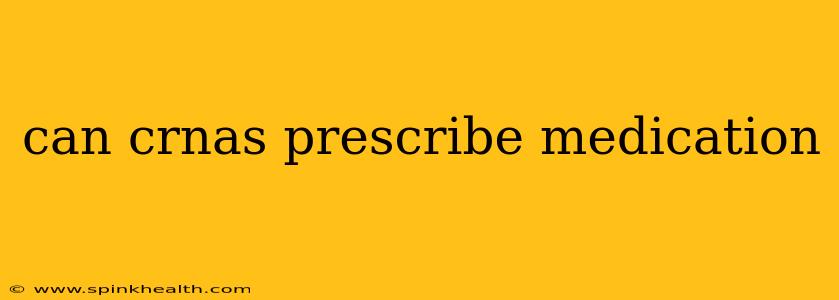Can CRNAs Prescribe Medication? The Complex Answer
The question of whether Certified Registered Nurse Anesthetists (CRNAs) can prescribe medication isn't a simple yes or no. It's a nuanced answer that depends heavily on the specific state's laws and regulations, as well as the practice setting. Let's unravel this complexity with a story.
Imagine Sarah, a highly skilled CRNA working in a bustling metropolitan hospital. She expertly manages anesthesia during complex surgeries, her calm demeanor a reassuring presence in the operating room. After the surgery, Sarah assesses her patient's pain levels and determines the need for post-operative analgesics. But can she write the prescription herself?
The answer, in Sarah's case (and many others across the country), is likely yes, but with important caveats. Many states grant CRNAs prescriptive authority, allowing them to independently prescribe medications within their scope of practice. This often includes medications related to anesthesia, pain management, and post-operative care. However, the specifics of what they can prescribe and under what circumstances vary widely.
What Determines a CRNA's Prescriptive Authority?
The key factors determining if a CRNA can prescribe medication are:
-
State Laws: This is the most crucial factor. Each state has its own Nurse Practice Act, which defines the scope of practice for registered nurses, including CRNAs. Some states explicitly grant full prescriptive authority to CRNAs, while others may have limitations or require collaboration with a physician. Checking your specific state's Nurse Practice Act is essential for accurate information.
-
Collaboration Agreements: Even in states granting independent prescriptive authority, some CRNAs might work under collaborative agreements with physicians. This arrangement usually involves regular consultation and oversight from a physician, ensuring patient safety and adherence to best practices.
-
Practice Setting: The setting where a CRNA practices also plays a role. In a hospital or surgical center, established protocols and oversight mechanisms might be in place, easing the prescribing process. In a more independent setting, such as a rural clinic, the requirements and regulations might be different.
-
Type of Medication: While many states allow CRNAs to prescribe a broad range of medications relevant to their practice, specific restrictions might apply to controlled substances. The rules regarding prescribing controlled substances are generally stricter and vary widely based on the state and the specific drug.
Can CRNAs Prescribe Controlled Substances?
This is a particularly crucial question, and the answer, again, depends entirely on the state. Some states allow CRNAs to prescribe controlled substances with appropriate DEA registration and adherence to state regulations. Others may require collaboration with a physician, or may outright prohibit the prescription of certain controlled substances by CRNAs.
What Happens if a CRNA Doesn't Have Prescriptive Authority?
If a CRNA lacks prescriptive authority in a specific state or under specific circumstances, they would need to collaborate with a physician to ensure that patients receive the necessary medications. This collaborative model ensures patient safety and allows for a comprehensive approach to patient care.
How Can I Find Out if CRNAs in My State Can Prescribe Medication?
The best way to determine a CRNA's prescriptive authority in your state is to consult the state's board of nursing website or the relevant state Nurse Practice Act. This official source will provide the most accurate and up-to-date information.
In conclusion, the ability of a CRNA to prescribe medication is not universally consistent. It's a complex issue governed by state-specific laws and regulations, practice settings, and collaboration agreements. Always consult the relevant state resources for the most accurate and current information.

